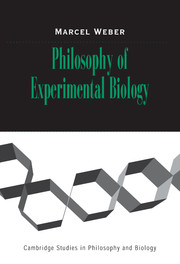Book contents
- Frontmatter
- Contents
- Preface
- Acknowledgements
- 1 Introduction
- 2 Reductionism and the Nature of Explanations
- 3 Discovery: Solving Biological Problems
- 4 Scientific Inference: Testing Hypotheses
- 5 Experimental Systems: A Life of Their Own?
- 6 Model Organisms: Of Flies and Elephants
- 7 Reference and Conceptual Change: Out of Mendel's Garden?
- 8 Developmental Biology and the Genetic Program: Explaining Ontogeny
- 9 Scientific Realism: In Search of the Truth
- Notes
- Bibliography
- Index
1 - Introduction
Published online by Cambridge University Press: 08 July 2009
- Frontmatter
- Contents
- Preface
- Acknowledgements
- 1 Introduction
- 2 Reductionism and the Nature of Explanations
- 3 Discovery: Solving Biological Problems
- 4 Scientific Inference: Testing Hypotheses
- 5 Experimental Systems: A Life of Their Own?
- 6 Model Organisms: Of Flies and Elephants
- 7 Reference and Conceptual Change: Out of Mendel's Garden?
- 8 Developmental Biology and the Genetic Program: Explaining Ontogeny
- 9 Scientific Realism: In Search of the Truth
- Notes
- Bibliography
- Index
Summary
How can scientists understand the intricate processes that occur inside the tiny cells of a living organism? They tell us about strange-shaped protein molecules that chemically transform foodstuffs to provide the cell with energy, molecules that rotate like propellers, molecules that scan the DNA double helix for structural damage, molecules that turn genes on and off, molecules that pull chromosomes apart when the cell divides, molecules that make the cell crawl around on a surface, and so on. It appears like magic that humans should be able to look inside the cell and unveil all this minuscule clockwork. Yet scientists seem to have found ways of doing exactly that. How is this possible? If scientists are not magicians but people with the ordinary range of human cognitive abilities, how do they deploy these abilities in order to understand life itself?
A traditional answer would be that scientists invent speculative theories or hypotheses, which are then tested by experiments in accordance with the rules of the scientific method. At least this is how an experimental science proceeds according to two major traditions in the philosophy of science: Critical Rationalism and Logical Empiricism. The former approach was championed by Karl Popper, while the latter grew out of the logical positivism of the Vienna Circle. Both Critical Rationalists and Logical Empiricists thought that they could find out about the scientific method on the basis of logical considerations alone.
- Type
- Chapter
- Information
- Philosophy of Experimental Biology , pp. 1 - 17Publisher: Cambridge University PressPrint publication year: 2004
- 1
- Cited by



